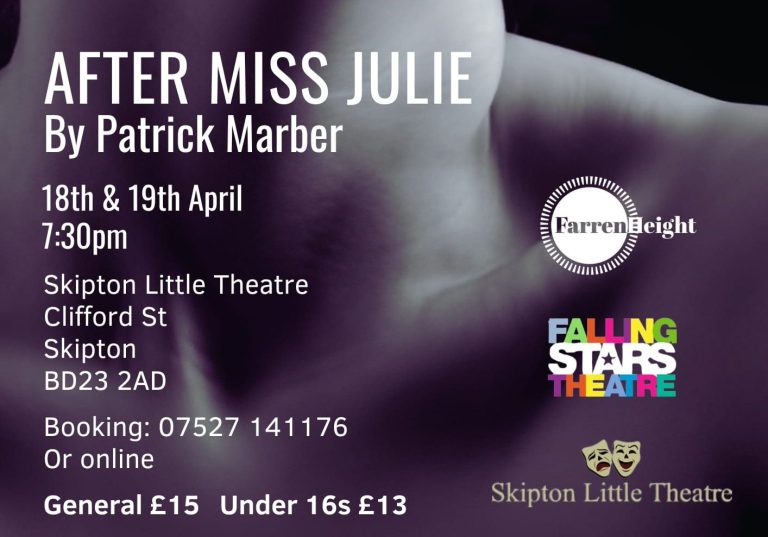AFTER MISS JULIE

18 & 19 April 2025
Skipton Little Theatre
August Strindberg’s original play, Fröken Julie – written in 1888 – is considered to be a benchmark in naturalistic theatre. For his version, playwright Patrick Marber relocates the events to the humid evening of 7 July 1945, where the inhabitants and staff at a large English country house, belonging to a Labour peer, celebrate the party’s landslide General Election victory which marks Winston Churchill’s departure from office.
Meanwhile, below stairs, the mistress of the house sets in motion a sexually-charged battle of wits between herself and two servants which forms the basis of both a brutal love story and a battle for supremacy informed by the trappings of the class structure at a moment of significant societal change.
After Miss Julie was originally commissioned in 1995 for the BBC as part of their Performance offering – a programme which ran for seven series on BBC 2 and featured both classic and new plays, with radical reworkings of some texts which included Penny Woolcock’s Macbeth On The Estate. Marber also directed his updated version which starred Phil Daniels, Kathy Burke and Geraldine Somerville in the title role.
In 2003 it was adapted for the stage in collaboration with cast members Kelly Reilly (Miss Julie), Richard Coyle (John), Helen Baxendale (Christine), and the director Michael Grandage for a premiere at the Donmar Warehouse in London. It has subsequently been revived by, amongst other, the Young Vic in the West End and at the Tod Haimes Theatre on Broadway.
Of his both his initial screenplay and the subsequent stage script, Marber has described the text as being “not a translation of Miss Julie. Rather, it is a ‘version’ of the original – with all the ambiguity that word might suggest. I have been unfaithful to the original. But conscious that infidelity might be an act of love.”
Content warning: This production contains themes of a sexual nature, references to sexual violence and derogatory language towards women.
Writer : Patrick Marber
Patrick Marber was born in London and began his theatrical life as part of the comedy duo Dross Bros with university friend Guy Browning. before becoming part of the writer / performer team on Radio 4's On The Hour where one of his contributions was the co-creation of the Alan Partridge character. The series would see various radio & TV spin-offs including The Day Today and Knowing Me, Knowing You With Alan Partridge in which he worked as a writer and performer, and his working relationship with Steve Coogan also led to both on and off-screen contributions to Paul Calf's Video Diary and the Coogan's Run series.
His first play, Dealer's Choice - which he also directed - premiered in 1995 at the National Theatre with the original BBC Performance production of After Miss Julie coming in the same year. His second stage play Closer opened in 1997, winning an Olivier award for Best New Play and has subsequently been translated into 30 languages, and was adapted into a Hollywood film in 2004.
He has written an number of other original plays including Howard Katz (2001) and The Red Lion (2015) in addition to a range of new adaptions of old texts such as Don Juan In Soho (2006) - a version of Molière's Don Juan - and Eugene Ionesco's Exit The King (2018).
In addition to this, Marber is an esteemed director, with credits that include Dennis Potter's Blue Remembered Hills (1996), The Caretaker by Harold Pinter and most recently this year's revival of The Producers by Mel Brooks & Thomas Meehan.
Photo by Helen Maybanks.

We need your consent to load the translations
We use a third-party service to translate the website content that may collect data about your activity. Please review the details in the privacy policy and accept the service to view the translations.